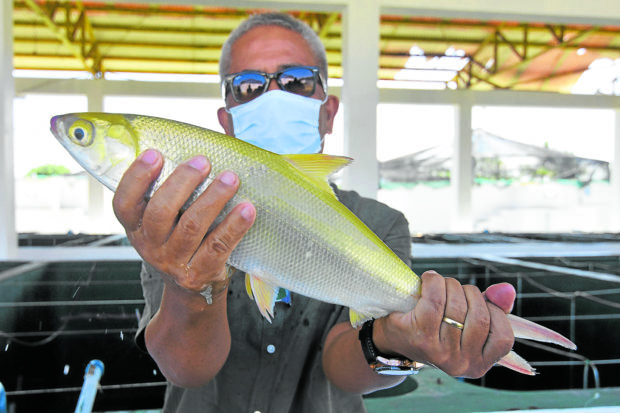In Dagupan, BFAR raises rare golden ‘bangus’ in stress-free pond

POND TREASURE Wesley Rosario, the Bureau of Fisheries and Aquatic Resources center chief in Dagupan City, says the golden hue displayed by a pair of “bangus” (milkfish) donated to the agency by fishpond owners in Binmaley, Pangasinan, may be due to an abnormality in its pigmentation, which is a form of albinism. —WILLIE LOMIBAO
DAGUPAN CITY, Pangasinan, Philippines — Two rare golden “bangus” (milkfish) being raised by the Bureau of Fisheries and Aquatic Resources (BFAR) research center here are gaining public attraction, but their caretakers are keeping them away from visitors.
They have isolated the pair in a 1,200-square-meter fishpond to avoid “stressful environment,” according to Wesley Rosario, the BFAR research center chief.
“It’s good to see that they look healthy and happy in their new home,” Rosario said.
He said the delicate care for the golden bangus included restricting their exposure to visitors, regularly giving them commercial feed, and maintaining the pond’s proper water quality.
From a distance
To avoid an encounter with visitors, the fish could only be viewed from a distance.
One bangus was turned over to the BFAR on June 19 by Rommel Filomeno, a fishpond owner in Binmaley town. The other was donated by Arnel Fernandez, also from Binmaley, on July 27.
Both fish are around a year old and weigh nearly a kilogram each.They were the second and third golden bangus that were documented in the country. The first was discovered in 2012 and was also turned over to the BFAR but it died in June of the same year, reportedly due to stress caused by visitors who took turns in taking photos of the fish.
Its death was also linked to dissolved oxygen in its pond.
Rosario said the fish’s golden scales, head, fins and tail are a deviation from the silver bangus. This could be due to an abnormality in its pigmentation, which is a form of albinism in mammals, he said.
“We hope we can breed them when they are already sexually mature, which is five years from now. So it would take four more years before they can breed,” Rosario said.
—Yolanda Sotelo